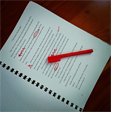 The first draft is done! Hoo-freaking-ray! Recently on the blog, I wrote about how it felt to write the words ‘The End’ on a novel I’ve been working on for two years.
The first draft is done! Hoo-freaking-ray! Recently on the blog, I wrote about how it felt to write the words ‘The End’ on a novel I’ve been working on for two years.
Now what?
Now the real work begins.
As I wrote on twitter, when you type the words ‘The End’, it’s not really the end of anything. It’s the beginning. Of re-writing.
All writing is re-writing is a piece of advice that’s stuck in my head ever since my uni lecturer, Jane Messer (whose truly excellent writing tips you can find here) said it in the first month of my creative writing studies.
For a writer like me, this kind of sucks. I come from a journalism background, where the focus is on getting the words done by deadline, and then moving on. New day, new story.
Creative writing is very different. It has no external deadline. Sure, you can impose a deadline on yourself, but it’s nothing like having a daily 6pm non-negotiable deadline hanging over your head.
When writing creatively, editing is a potentially never-beginning and never-ending process. And what the hell does it mean, anyway, to EDIT something you’ve written yourself. Surely, if you wrote it to begin with, then you must be pretty happy with it? Right?
Wrong.
Everyone writes differently. Some people edit as they go. Some simply free-write, and fix everything up later. And some, like me, do a bit of both. Regardless, there comes a point where you have to read a work in its entirety. And this can only be done when the first draft is done.
I guarantee that even those who edit as they go, and mull over every single word and sentence until it is just right, still have to come back and edit it all over again at the end for the simple fact that time has lapsed between the first and last words being written. Usually months. Possibly years. The point I’m making is – mistakes will have been made. A boy with blonde hair may now have brown hair. Hey – that’s understandable when you consider that you first wrote about his hair six months ago.
Of course, self-editing goes much further than this. For me, it’s a process of interrogating the work, and asking many, many questions of it. Some deep ones (does this book say what I want it to say?) and some more superficial (how many times have I used the word ‘just’ in this book?).
The process is difficult. I have an emotional and pragmatic attachment to the words that are already on the page. Changing them, deleting them, or adding new ones requires discipline, and a relatively dispassionate disposition.
The story is what matters. In a sense, the writer is its slave, and not its master. You have to do what needs to be done. That’s editing. Doing what needs to be done.
* And next week, I’ll write in more detail about what needs to be done

I find the editing process a way of solidifying my thoughts. I free write like you – often my second draft is a complete re-write but it never feels as laboured as the first draft. It is a way that I allow my words to find itself. It does mean that I know I have to write something at least twice! Best of luck – I am assuming a lot of tea will be consumed….
Hi Simmo. Not too much tea.. Trying to keep my bottom glued to the chair as much as possible. Thanks for reading and commenting! Cass